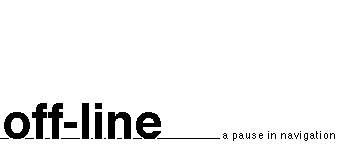According to a report by Jupiter Media Metrix (see
Conservative internet)
people in the United States spend 60 percent of their time online using
the products and services of 14 companies (a year ago they were 110)
and 50 percent of the time is spent on just four (Aol, Microsoft, Yahoo
and Napster). As all research and statistics, these figures must
be taken with a strong dose of skepticism. But web
“concentration” is a problem that needs to be considered.
At first glance, this looks like the death of the internet. The net by its nature,
can’t be centralized. One of its basic qualities is diversity. With
everything concentrated in a few hands, what’s left of a world in which
everyone, large or small, has a share of voice, in which the “small”
can compete with the “big”?
But is it really so?
First of all, “general” statistics tend to overestimate
“generic” resources. They can’t measure intense use
of specialized, or in any way specific, sources by relatively small numbers
of people. Therefore variety and diversity are there – but they are
not considered in this type of report.
Another (obvious but basic) consideration is that
visiting websites si only a party of internet activity – and
not necessarily the most important.
But there is a question that needs to be answered. What’s
happened to that “level playing field” that was
supposed to offer “equal opportunity” to all? It a
way... it was never there. No playing field is “level”.
In an un-level environment
each actor needs to choose the playing field that is best slanted in
relation to what he or she is doing. There is a place for
all. But for most of us it’s very different from that vast,
generic, homogenized and boring flatland that is dominated by
a few large “global” players.
It’s no paradox that the more concentrated are the big
systems the more space is left that they can’t cover effectively
– and opens opportunities for countless different resources.
Even for very large companies it becomes more and more
difficult to compete in an environment dominated by a
diminishing number of worldwide giants (and we haven’t
even seen, so far, the full effect of the monstrous concentration
of Aol and Time-Warner). But while those huge beasts fight
each other for domination of their territory, vast areas
remain free for people concentrating on more specific
services, with a more precise and less diluted identity.
If that’s a big problem everywhere, it’s even
bigger for anyone outside of the United States. European
“giants” are pigmies in the competition for
generic, web-centered concentration. Even language is no
barrier. Any country with a non-marginal presence in the
internet is being invaded by “local language”
versions of the big international (de facto American) systems.
Competition on their ground is impossible. There is an
overwhelming difference in resources (non only financial).
Imitation is the road to defeat. It is possible to compete (or even
survive) only by developing unique and different styles and personalities
– and providing a quality of personal care and dialogue that
the generalized and greedy cyclops can’t manage.



